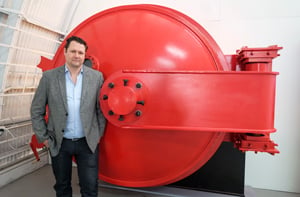Hyperloop Transportation Technologies in Playa Vista has signed partnership agreements with several South Korea-based entities as the transportation venture moves forward on plans to implement its patented technologies in that country.
The company signed deals with the South Korean government’s department of technological innovation and infrastructure, the Korea Institute of Civil Engineering and Building Technology, as well as with engineering research school Hanyang University, according to a statement released last week.
The latest deals include licensing and research development of a nationwide tube infrastructure, a full-scale test bed, licensing and development of tube technology, and the co-development of safety standards and regulation for the hyperloop system, according to the firm.
Hyperloop Transportation’s global team includes more than 800 engineers and other staff, the majority of whom work remotely and are not salaried employees. The company creates and licenses technologies related to hyperloop travel and said it has commenced construction of the world’s first passenger hyperloop capsule.
Hyperloop Transportation was founded in 2013 after Tesla Inc. and Space Exploration Technologies Corp., or SpaceX, Chief Executive Elon Musk released into the public domain a white paper detailing a theoretical vacuum transportation tube, or hyperloop, that could move passengers at 800 miles an hour. The entrepreneur opened the conversation but left the concept’s construction up to others.
Hyperloop Transportation is one of the companies trying to make Musk’s vision a reality. Downtown-based Hyperloop One and Arrivo are two of its local competitors.
Chief Executive Dirk Ahlborn said South Korea represents Hyperloop Transportation’s first commercial customer. The company said it has also signed agreements in California, Slovakia, Abu Dhabi, Czech Republic, France and Indonesia.
“When you’re building a completely new mode of transportation, the most difficult part is getting regulations approved,” Ahlborn said. “If you don’t have the government actively supporting you, it could take decades to move something commercially, so it’s a really important milestone for us when we work with a new government.”
– Natalie Hoberman

